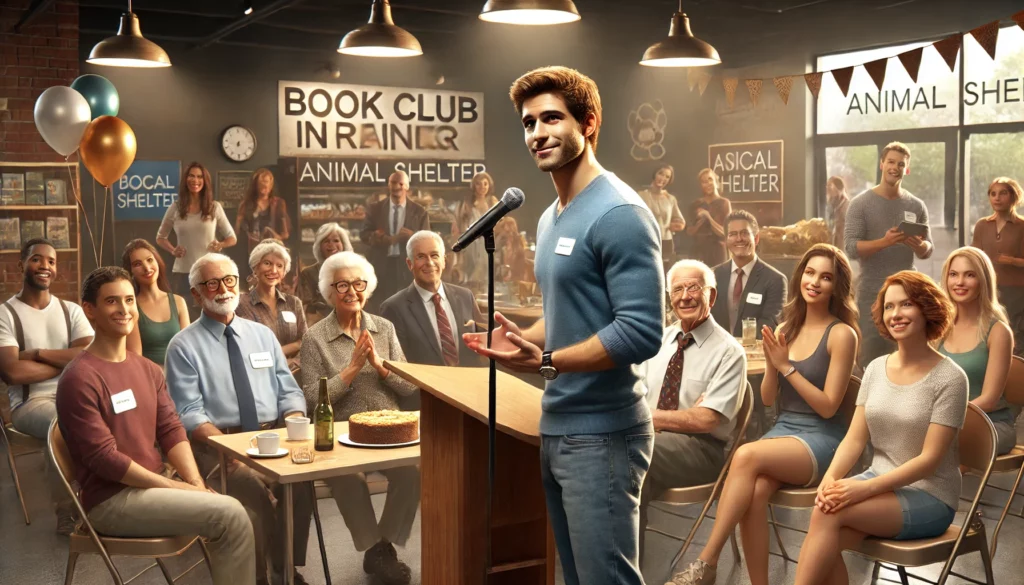In a world where anxiety often feels overwhelming, these inspiring tales of triumph demonstrate the human capacity for growth and resilience. These motivational stories about anxiety show that with determination and support, we can transform our greatest challenges into sources of strength and personal growth.
The Musician’s Comeback

As John’s fingers danced across the guitar strings, the familiar melody filled the packed auditorium. The audience swayed in unison, their eyes closed, lost in the music. John felt a surge of joy, his heart racing not from fear, but from the thrill of performance. It was hard to believe that just three years ago, he thought he’d never play on stage again.
The thunderous applause faded, and John’s mind drifted back to that fateful night…
The lights had been blinding, the crowd’s chatter deafening. John’s hands trembled as he stepped onto the stage, his guitar feeling like a lead weight. As he struck the first chord, his mind went blank. The notes jumbled, his fingers fumbled, and the audience’s murmurs grew louder. Panic seized him, his breath coming in short gasps. He fled the stage, leaving behind a stunned silence and his shattered confidence.
For months after, John couldn’t even look at his guitar without feeling nauseous. The instrument that had once been his solace now mocked him from the corner of his room. He’d curl up on his bed, replaying that disastrous performance in his mind, each memory a fresh wound.
It was Sarah, his sister, who finally broke through his despair. “Remember when you first started playing?” she’d asked one day, pulling out an old photo album. “You were terrible!” she laughed, showing him a picture of a gangly teenager with a too-big guitar. “But you kept at it, John. You didn’t give up then. Don’t give up now.”
Her words had struck a chord. That night, for the first time in months, John picked up his guitar. His fingers were clumsy, the strings felt foreign, but as he played, a tiny spark of hope ignited in his chest.
The journey back wasn’t easy. John started small, playing for Sarah in their living room. His hands would shake, and sometimes he’d have to stop, his breath coming too fast. But Sarah was always there, patient and encouraging. Gradually, he expanded his audience – a few friends, then a small gathering at a local café.
Each performance was a battle against his anxiety. John learned breathing techniques, practiced visualization, and worked with a therapist to reframe his anxious thoughts. Slowly, the paralyzing fear began to loosen its grip.
A year after his breakdown, John played his first open mic night. As he waited for his turn, the old panic threatened to overwhelm him. But this time, he was prepared. He closed his eyes, took a deep breath, and reminded himself of how far he’d come. When he stepped on stage, the fear was still there, but so was determination.
The performance wasn’t perfect, but it was a triumph. As the last note faded, John realized he was grinning. The applause washed over him, no longer threatening, but affirming.
Now, as John stood on the grand stage, he marveled at his journey. The anxiety hadn’t disappeared completely – he could feel it even now, a faint flutter in his stomach. But it no longer controlled him. Instead, it reminded him of his strength, of how much he’d overcome.
As he launched into his next song, John caught Sarah’s eye in the front row. She gave him a thumbs up, her smile radiant with pride. John smiled back, his heart full of gratitude and joy.
The music swelled, and John lost himself in the melody, each note a testament to his resilience.
Moral of the story: Overcoming anxiety is a journey of small steps and persistent effort. With determination, support, and self-compassion, it’s possible to transform fear into strength and reclaim one’s passions.
The Anxious Public Speaker

As Sarah stood at the podium, her gaze sweeping across the sea of expectant faces, she felt a sense of calm confidence that would have been unimaginable just a year ago. The butterflies in her stomach now felt more like a gentle flutter of excitement rather than the paralyzing fear she once knew. With a deep breath, she began her speech.
“Ladies and gentlemen, today I want to share a story with you. A story about fear, perseverance, and the power of facing our demons head-on.”
Sarah’s mind drifted back to that pivotal day, and her voice took on a storyteller’s cadence as she transported her audience to a time when public speaking was her greatest nightmare.
“Picture this: a boardroom filled with stern-faced executives, all eyes fixed on a young woman trembling at the front of the room. That woman was me, one year ago…”
The fluorescent lights seemed to burn into Sarah’s skin as she fumbled with her notes, her voice barely above a whisper. The words she had rehearsed countless times evaporated from her mind, leaving nothing but a deafening silence. She could feel the pity and discomfort radiating from her colleagues. As sweat beaded on her forehead and her vision began to blur, Sarah knew she was moments away from a full-blown panic attack.
Somehow, she managed to stammer through her presentation, but the damage was done. As she fled the boardroom, cheeks burning with shame, Sarah vowed never to put herself through such torture again.
But fate, it seemed, had other plans.
“Just when I thought I could hide from my fears,” Sarah continued, her present-day voice steady and clear, “an opportunity arose that I couldn’t ignore. Our company was on the verge of landing its biggest client yet, and I was the only one with the expertise to make the pitch.”
Sarah described how she stood at a crossroads, torn between her paralyzing fear and her ambition. It was her mentor, David, who provided the push she needed.
“He told me something I’ll never forget,” Sarah said, her eyes sparkling with the memory. “‘Sarah,’ he said, ‘anxiety is just excitement without the breath. Learn to breathe, and you’ll learn to thrive.'”
With David’s encouragement, Sarah embarked on a journey of self-discovery and growth. She sought help from a therapist who specialized in public speaking anxiety. She joined a local Toastmasters club, forcing herself to speak in front of strangers week after week. Each time, the fear was there, but each time, it became a little more manageable.
“I learned to reframe my anxious thoughts,” Sarah explained to her captivated audience. “Instead of seeing a room full of judgmental faces, I trained myself to see potential allies, people who wanted me to succeed.”
Sarah recounted the ups and downs of her journey – the small victories, the setbacks, and the moments of doubt. She spoke of sleepless nights spent rehearsing, of breathing exercises done in bathroom stalls before meetings, and of the gradual building of her confidence.
“And then came the day of the big pitch,” Sarah said, her voice filled with a mixture of remembered nervousness and pride. “As I stood before the client’s board, I felt the familiar surge of anxiety. But this time, I welcomed it. I took a deep breath, remembered all I had learned, and began to speak.”
Sarah’s voice swelled with emotion as she described the successful pitch, the applause that followed, and the realization that she had not only faced her fear but conquered it.
Returning to the present, Sarah looked out at her audience, seeing in their eyes the same mix of anxiety and hope that had once defined her own journey.
“So, why do I tell you this story?” she asked, her voice strong and clear. “Because each of you has your own stage to conquer, your own fears to face. And I’m here to tell you that it’s possible. With perseverance, support, and a willingness to confront your anxieties head-on, you can transform your greatest weakness into your most powerful strength.”
As Sarah concluded her speech to thunderous applause, she felt a profound sense of gratitude for the journey that had brought her to this moment. She had come full circle, from a trembling novice to an inspirational speaker, and the victory was sweeter than she could have ever imagined.
Moral of the story: Our greatest fears often hold the key to our most significant growth and achievement. By facing our anxieties with courage and persistence, we can unlock potential we never knew we had.
Related post: 3 Motivational Short Stories About Focus
The Social Butterfly in Training

Mark’s palms were sweaty as he stood in front of his bedroom mirror, rehearsing a simple “Hello” for the thousandth time. At 28, he had spent most of his life avoiding social interactions, his anxiety turning even the simplest conversations into monumental tasks. But today was different. Today, Mark had decided to change.
It started with a chance encounter at his local coffee shop. As he waited for his usual order, carefully avoiding eye contact with anyone around him, he overheard a conversation between two elderly gentlemen.
“You know, Jim,” one of them said, “I’ve realized that at the end of our lives, it’s not the work we’ve done or the money we’ve made that matters. It’s the connections we’ve formed, the lives we’ve touched.”
Those words struck a chord deep within Mark. He realized that his social anxiety wasn’t just holding him back—it was robbing him of the very essence of life.
That night, unable to sleep, Mark made a decision. He would tackle his social anxiety head-on, one small step at a time. He scribbled down a plan in his journal: say hello to one new person every day for a week.
The first day was nerve-wracking. Mark’s heart raced as he approached his neighbor in the elevator. “H-hello,” he stammered, immediately looking away. His neighbor, surprised but pleased, returned the greeting with a warm smile. It wasn’t much, but for Mark, it felt like climbing Everest.
As the days passed, Mark stuck to his plan. Some interactions were awkward, others surprisingly pleasant. By the end of the week, he had exchanged greetings with seven new people, including the barista at his regular coffee shop who now knew his name.
Encouraged by this small victory, Mark set new goals. He joined a local book club, forcing himself to attend meetings even when his anxiety screamed at him to stay home. The first few sessions were tough—he sat silently, barely able to look up from his book. But gradually, he began to contribute. His insightful comments about the books they read caught the attention of other members, and soon, he found himself engaged in discussions that extended beyond the meetings.
Months passed, and Mark’s world began to expand. He volunteered at a local animal shelter, finding it easier to interact with people when focused on a shared task. He even mustered the courage to accept an invitation to a coworker’s birthday party—something he would have reflexively declined in the past.
There were setbacks, of course. Some days, the anxiety would resurface with a vengeance, leaving Mark feeling drained and discouraged. But he had come too far to give up. He sought help from a therapist, learning cognitive behavioral techniques to manage his anxious thoughts. He practiced mindfulness, grounding himself in the present moment when social situations felt overwhelming.
A year into his journey, Mark found himself in a position he never thought possible. He was organizing a fundraiser for the animal shelter, a role that required him to speak to groups, coordinate with volunteers, and even give a short speech at the event.
As he stood at the podium on the day of the fundraiser, Mark felt the familiar flutter of anxiety in his stomach. But alongside it was something new—excitement. He looked out at the crowd and saw not judgmental strangers, but a community he was now a part of. He saw the elderly gentlemen from the coffee shop, his book club friends, his coworkers, and many others he had met along the way.
Taking a deep breath, Mark began his speech. His voice was steady, his words clear. As he spoke about the shelter’s work and the importance of community support, he realized how far he had come. The shy, isolated person he once was seemed like a distant memory.
After the event, as Mark mingled with the attendees, accepting congratulations and chatting easily, he caught sight of himself in a mirror. The reflection showed a confident, smiling man surrounded by people—a true social butterfly in the making.
That night, as he wrote in his journal, Mark reflected on his journey. He wasn’t “cured” of his social anxiety—it still made appearances from time to time. But he had learned to coexist with it, to push through it, and to build a rich, connected life despite it.
Moral of the story: Overcoming social anxiety is a gradual process that requires courage, persistence, and self-compassion. By taking small, consistent steps and challenging our comfort zones, we can transform our fears into strengths and build meaningful connections that enrich our lives.
Related post: 5 Motivational Stories About Not Giving Up